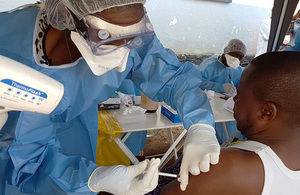Health
Keeping medicines safe
After its authorisation a medicine is used by many patients, often together with other medicines. Over time, certain side effects may emerge that have not previously been identified. It is therefore essential that the safety of all medicines is continuously monitored throughout their use in healthcare practice.
- Read more
- 333 reads
NIH officials: closing treatment gaps critical to ending the U.S. HIV epidemic
Daily antiretroviral therapy (ART) that suppresses HIV to levels undetectable by standard blood tests is lifesaving for individuals living with HIV and prevents sexual transmission of the virus to others. The public health community must use targeted interventions, however, to do a better job of reaching populations with low levels of viral suppression, according to experts from the National Institute of Allergy and Infectious Diseases (NIAID), part of the National Institutes of Health.
- Read more
- 318 reads
CDC Releases 2018 Breastfeeding Report Card
Of the approximately 4 million babies born in 2015, most (83.2 percent) started out breastfeeding – but many stop earlier than recommended, according to the 2018 Breastfeeding Report Card released by the Centers for Disease Control and Prevention (CDC), on August 20.
- Read more
- 360 reads
Researchers find potential new gene therapy for blinding disease
Scientists funded by the National Eye Institute (NEI) report a novel gene therapy that halts vision loss in a canine model of a blinding condition called autosomal dominant retinitis pigmentosa (adRP). The strategy could one day be used to slow or prevent vision loss in people with the disease. NEI is part of the National Institutes of Health.
- Read more
- 322 reads
NIH-led research team develops predictor for immunotherapy response in melanoma
In a new study, researchers developed a gene expression predictor that can indicate whether melanoma in a specific patient is likely to respond to treatment with immune checkpoint inhibitors, a novel type of immunotherapy. The predictor was developed by Noam Auslander, Ph.D., with other researchers in the Center for Cancer Research (CCR) at the National Cancer Institute (NCI), part of the National Institutes of Health, and colleagues at Harvard University, Cambridge, Massachusetts; the University of Pennsylvania, Philadelphia; and the University of Maryland, College Park.
- Read more
- 323 reads
Syria: WHO appeals for funding to sustain critical health care for millions trapped by conflict

A seven-year-old child stands in front of her damaged school in Idleb, Syria. October 2016.
- Read more
- 306 reads
NIH begins clinical trial of live, attenuated Zika vaccine
Vaccinations have begun in a first-in-human trial of an experimental live, attenuated Zika virus vaccine developed by scientists at the National Institute of Allergy and Infectious Diseases (NIAID), part of the National Institutes of Health.
- Read more
- 361 reads
UK response to the Ebola outbreak in North Kivu, DRC

Image: WHO
- Read more
- 348 reads
Blood test may identify gestational diabetes risk in first trimester
A blood test conducted as early as the 10th week of pregnancy may help identify women at risk for gestational diabetes, a pregnancy-related condition that poses potentially serious health risks for mothers and infants, according to researchers at the National Institutes of Health and other institutions.
- Read more
- 369 reads
That stinks! 1 in 15 Americans smell odors that aren’t there
Imagine the foul smell of an ash tray or burning hair. Now imagine if these kinds of smells were present in your life, but without a source. A new study finds that 1 in 15 Americans (or 6.5 percent) over the age of 40 experiences phantom odors. The study, published in JAMA Otolaryngology-Head and Neck Surgery, is the first in the U.S. to use nationally representative data to examine the prevalence of and risk factors for phantom odor perception. The study could inform future research aiming to unlock the mysteries of phantom odors.
- Read more
- 418 reads
Human Rights
Fostering a More Humane World: The 28th Eurasian Economic Summi

Conscience, Hope, and Action: Keys to Global Peace and Sustainability

Ringing FOWPAL’s Peace Bell for the World:Nobel Peace Prize Laureates’ Visions and Actions

Protecting the World’s Cultural Diversity for a Sustainable Future

Puppet Show I International Friendship Day 2020

